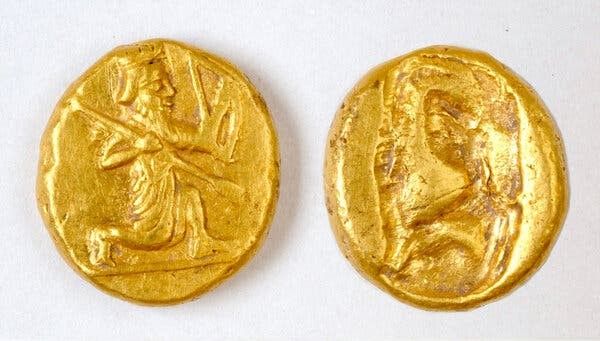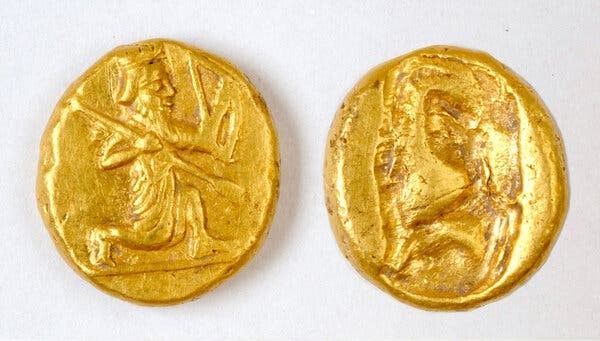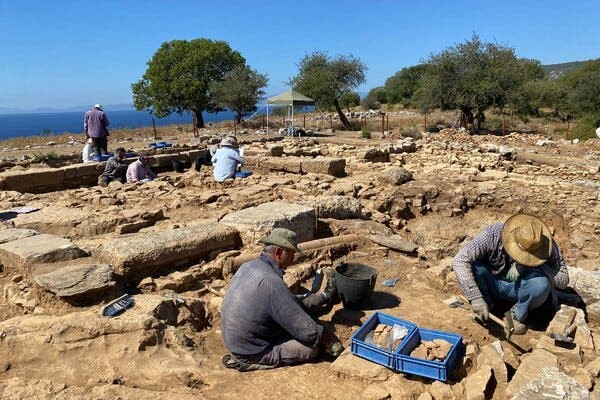


An ancient treasure trove of rare Persian gold coins dating back to the Peloponnesian War was recently unearthed by archaeologists in Turkey.
University of Michigan archaeologist Christopher Ratté and his research team discovered the bullion coins purely by chance while digging beneath the courtyard of a house in the ruins of Notion, an ancient city-state in modern-day Turkey. “The coins were buried in a corner of the older building,” Dr. Ratté told the New York Times. “We weren’t actually looking for a pot of gold.”
The researchers first uncovered a small clay jug, called an olpe, which was reason enough to rejoice. But hidden inside the olpe were dozens of gold coins, known as darics.
In the fifth century B.C., darics were mainly used to pay soldiers and mercenaries, with one daric equal to a month’s salary, so Ratté speculated that one such soldier may have buried his life savings, representing years of pay, in the jug before being killed in battle.
University of Oxford archaeologist Andrew Meadows, who was not involved in the dig, said he was not aware of any other gold coin stash of this type ever being discovered in Asia Minor. “This is a find of the highest importance,” Meadows said. “The archaeological context for the hoard will help us fine-tune the chronology of Achaemenid gold coinage.”
The Notion archaeological site covers 80 acres in western Anatolia, which divides Asia from Europe and has been a strategically critical piece of land for thousands of years. Notion was one of the Greek-speaking communities that arose during the beginning of the first millennium B.C. and the gold coins were buried during a time of war between the regional powers over the contested frontier zone.
“This was true in deepest antiquity, as remembered in the story of the Trojan War,” Dr. Ratté said. “And it remains true to this day, as demonstrated by the Syrian refugee crisis.” He pointed out that the small harbor to the east of the city was one of the departure points for Syrian refugees fleeing to Europe during the refugee crisis of 10 years ago.
Anatolia is the birthplace of the stater, the first state-issued coin in Western world history, which was minted by the seafaring Lydian people. The weight and design of the Lydian stater was standardized by King Alyattes around 610 B.C., who struck the coins in electrum, a natural alloy of gold and silver.
The king’s son and successor, Croesus, is credited with minting the first true gold coin, known as the Croeseid, and the expression ‘rich as Croesus’ is a reference to the massive gold riches of Lydia during his reign.
According to the Greek historian Thucydides, an Athenian general named Paches attacked and killed a group of Persian-aligned mercenaries at Notion In 427 B.C. after luring their commander into a trap. The Persian loyalists were then expelled, and Notion came under Athenian rule. Twenty years later, an important naval battle in the Peloponnesian War between Athens and Sparta was fought off the coast of Notion, which the Athenians used as a naval base.

Archaeologists digging at the Notion site - Credit: Notion Archaeological Project/University of Michigan
Dr. Ratté said that the buried gold coins might have been connected to the events of 427 B.C., or with the Athenian evacuation of Notion.
“It is possible it was not associated with either of these dramatic events,” he said, “but was simply the savings of a veteran mercenary soldier in a time and place when soldiers of fortune could make a lot of money if they were willing to risk their lives for the highest bidder.”
In 387 B.C., Notion and the rest of Ionia were reconquered by the Persian Empire, until the conquest of Alexander the Great in 334 B.C. Alexander and his immediate successors had many of the existing gold darics melted down and recast with their own image instead, which is why darics like the Notion trove are so rare today.
The Notion darics bear the likeness of the Persian king kneeling in a long tunic with a bow in his left hand and a long spear in his right, while the backs of the coins were left blank.
Dr. Ratté said that the fact that the treasure was never reclaimed is a clear indication that its owner was killed. “No one ever buries a hoard of coins, especially precious metal coins, without intending to retrieve it,” he said. “So only the gravest misfortune can explain the preservation of such a treasure.”
The gold coins are being stored at the Ephesus Archaeological Museum in Selcuk, Turkey, along with Athenian pottery also recovered at the Notion site.
Kitco Media
Ernest Hoffman
